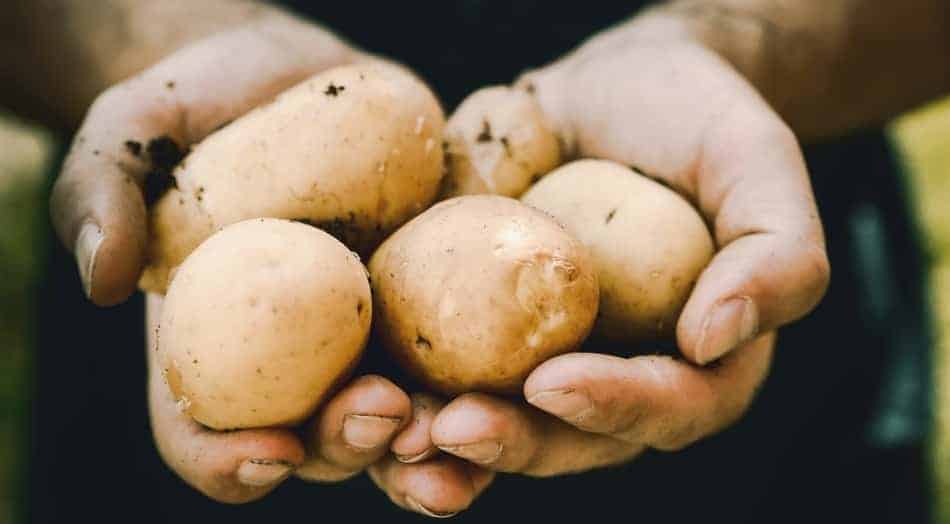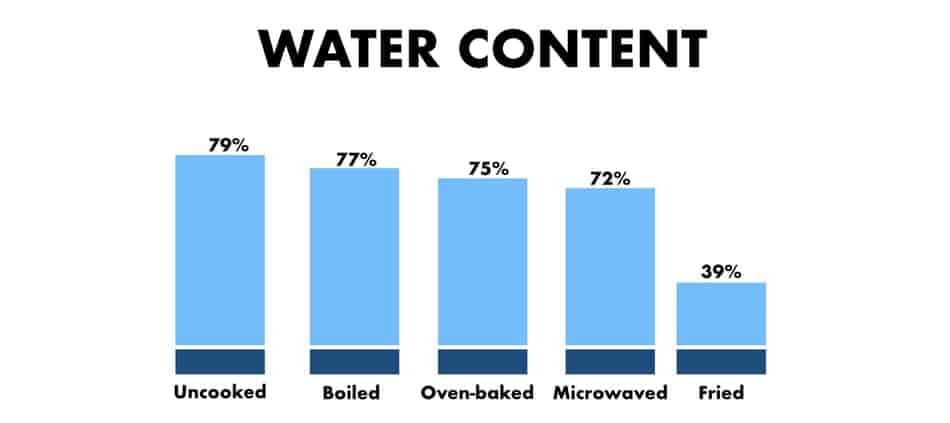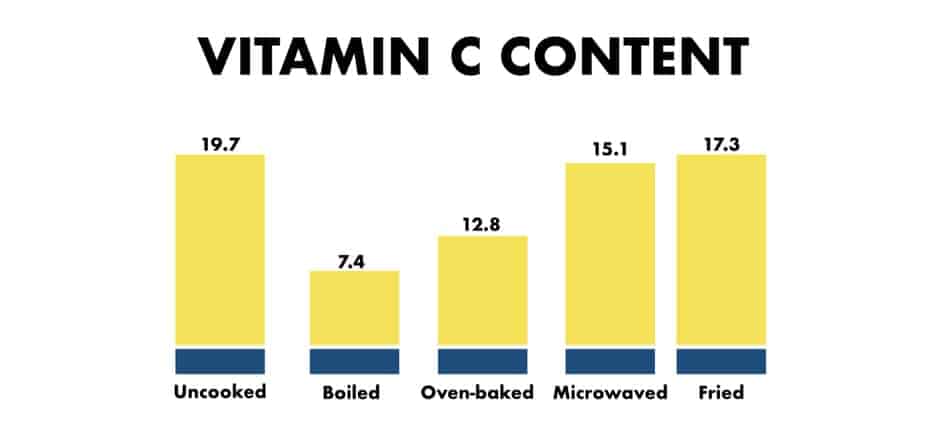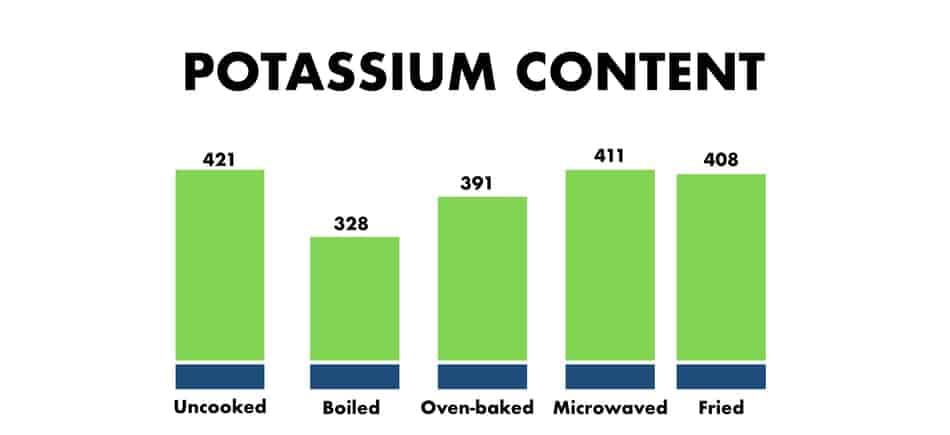In case you’re wondering, I eat a lot of potatoes, and because they can be cooked in multiple ways, I will show you how exactly potato changes its nutrition value and help you clarify should you weigh a potato before or after cooking?
You should weigh potatoes before cooking because, during the cooking process, they lose the water content, which concentrates nutrients. Raw potatoes contain 79% of water. Cooking potatoes in boiling water reduces water content to 77%, oven-baking reduces to 75%, and frying reduces to 39%.
Which is a big difference, depending on the way you use to cook your potatoes. And if you want to be specific with your calories, I did some in-depth research, and here are some things you should consider.

Does Potato Change Weight When Cooked?
Potatoes do change weight when cooked because the cooking process removes water and affects the profile of endogenous nutrients. Water loss and the amount of nutrient degradation will be strongly influenced by the method of cooking and the cooking time.
I literally live on potatoes. They not only have the highest satiety score, but they also have a lot of minerals and vitamins. However, those ratios can change together with cooking. I won’t bother you with all the details. So as an example, I will use water, vitamin C, and potassium to show the potential effect of cooking on nutritional composition.
Here are some of the changes that happens with the potatoes after different cooking methods (source).

- Boiled potatoes will keep the most amount of water (77%), which will decrease the total calorie volume per gram. With more water content, the potato has fewer calories per gram because most of its weight is from water.
- Oven-baked potatoes will have 75% of water content, which is not bad at all. I would think that baking will somehow dry them. But not necessarily.
- The microwaved potato will have a 72% of water content. I don’t own a microwave, and where I’m from, we rarely microwave potatoes anyway.
- Fried potatoes remove the most amount of water and absorb the fat from frying oil, which increases significantly the calorie value. This means it’s got less water, which will have more calories per gram of potato.
So from a water standpoint, the best option would be eating potatoes boiled and oven-baked. This comes hand in hand with calories because more water equals fewer calories.

- Boiled potatoes not surprisingly will leach over half of their vitamins C into the water. Vitamin C is hyper-sensitive to heat. So any prolonged period of heat like boiling potatoes for 30+ minutes will drain vitamin C significantly.
- Oven-baked potatoes will save over half of their vitamin C. So is a much better choice, comparing to boiled potatoes.
- The microwaved potato will have a whopping 15.1 mg/100g of vitamin C due to the short time under the heat.
- Fried potatoes will save the most vitamin C, but with a little caveat. Because frying time is relatively short, and it causes a large decrease in water, which can condense nutrients. So you have less weight. That’s why it may seem like frying saves the most.
For the vitamin C concentration, microwaving will have the best impact because it saves more water and vitamin C at the same time, comparing to frying.
If you wanna know should you count calories from olive oil, check out my article.

- Boiled potatoes seems to leach around a quarter of their potassium into the water.
- Oven-baked potatoes will lose only 30mg of potassium during the cooking time.
- The microwaved potato will have a lose only around 10mg during the cooking process.
- Fried potatoes similarly to microwaved cooking will lose only 13mg of potassium during processing.
From this data, we can see that the best option to save potassium is the microwave cooking.
Do Potatoes Lose Calories When Boiled?
Potatoes do not lose calories when boiled because calories in potatoes come from starchy carbohydrates that are not leached out to the water or melted out with the heat. In fact, the cooking process decreases the amount of water, therefore, increases the calorie value of potatoes.
Potatoes are cooked in a variety of different methods. These include boiling, roasting, baking, microwaving, and frying. And each of those processes somehow affects the nutrient density of the potatoes.
However, the number of calories remains the same. But because the overall weight goes down, so the percentage of calories is actually going up.
Unlike fat, carbohydrates cannot be leached out into the water during the cooking process. When you boil meat or fish, a lot of fat content will be leached into the water.
Also, when you grill or oven-bake meats, water and fat content will decrease. But with carbohydrates is different.
Carbohydrates in potatoes are mainly made of amylose and amylopectin, which cannot be melted or leached out. They can be, however, influenced by heat that will change digestibility (source).
Amylose and amylopectin in raw potatoes are resistant to amylolytic digestive enzymes. This means we cannot fully digest them. We get sick.
So to be fully digested, they need to be cooked. And when they’re cooked, the glucose can be easily extracted by enzymes, which increases their glycemic index (the speed of releasing glucose into the blood).
So technically, potatoes don’t change calories during the cooking process.
But they increase the speed of getting glucose into the blood.
Raw Potato vs Boiled Potato
Raw potatoes have a higher amount of nutrient profile than boiled potatoes. However, amylose in raw potato is resistant to digestive enzymes, therefore, raw potato can’t be fully digested. The cooking process decreases the resistance and increases digestibility.
You may have heard or seen people eating raw potatoes because they have “more” nutirion value that eating cooked.
Big mistake.
Because eating raw potatoes will make you sick.
In fact, when potatoes were introduced in Europe for the first time in the sixteenth century, they’re called “the devil’s apples” because people were getting sick.
Humans simply don’t have enzymes that allow us to eat raw potatoes (source).
So back then, they didn’t know what to do with potatoes, until they started cooking them.
During the cooking process, the starch is being gelatinized, which increases its solubility. This means your body can digest it easily.
In Conclusion
Weighing potato may have a sense if you’re counting calories or following some recipe. But in general, the number of calories will strongly depend on the water content that is in the potato.
This means the cooking process won’t influence directly the calories, but it will influence the water levels, which changes the calorie density of potatoes.
Frequently Asked Questions
Do Potatoes Shrink When Cooked?
Potatoes do shrink when cooked because they lose the water content. Uncooked potatoes are made of 21% of dry mass, (60-80% of potato mass is starch) and 79% of water. Depending on the cooking method, potatoes can lose anywhere from 2-40% of their weight.
When To Weigh Sweet Potato?
You should weigh sweet potatoes before cooking because the cooking process will change the nutrition profile by leaching out some of the nutrients and decreasing water content. The different water content will affect the overall calorie numbers per 100g of sweet potato.
Do Cooked Potatoes Weigh Less Than Raw?
Cooked potatoes do weigh less than raw because the cooking process eliminates a portion of water from the potatoes together with minerals and vitamins, therefore it is losing their weight. The most water reduction is done with frying and the least water reduction is done with boiling.
